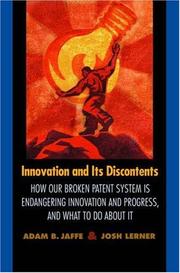| Listing 1 - 3 of 3 |
Sort by
|
Book
Abstract | Keywords | Export | Availability | Bookmark
 Loading...
Loading...Choose an application
- Reference Manager
- EndNote
- RefWorks (Direct export to RefWorks)
Jezus : laatste avondmaal --- Jezus : intocht in Jeruzalem --- Jezus : kooplieden in de tempel --- Jezus : lijden en dood --- Jezus : verrijzenisverhalen --- 472.83 --- Pasen --- Nieuwe Testament --- Christus --- Kinderbijbels --- Bijbelverhalen --- Prentenboeken --- Jeugdboeken 03-06 jaar --- Jezus Christus --- Kinderbijbel

ISBN: 9780691127941 0691127948 069111725X 9786613133380 1400837340 1283133385 9781400837342 9780691117256 9781283133388 Year: 2007 Publisher: Princeton, N.J. : Princeton University Press,
Abstract | Keywords | Export | Availability | Bookmark
 Loading...
Loading...Choose an application
- Reference Manager
- EndNote
- RefWorks (Direct export to RefWorks)
The United States patent system has become sand rather than lubricant in the wheels of American progress. Such is the premise behind this provocative and timely book by two of the nation's leading experts on patents and economic innovation. Innovation and Its Discontents tells the story of how recent changes in patenting--an institutional process that was created to nurture innovation--have wreaked havoc on innovators, businesses, and economic productivity. Jaffe and Lerner, who have spent the past two decades studying the patent system, show how legal changes initiated in the 1980's converted the system from a stimulator of innovation to a creator of litigation and uncertainty that threatens the innovation process itself. In one telling vignette, Jaffe and Lerner cite a patent litigation campaign brought by a a semi-conductor chip designer that claims control of an entire category of computer memory chips. The firm's claims are based on a modest 15-year old invention, whose scope and influenced were broadened by secretly manipulating an industry-wide cooperative standard-setting body. Such cases are largely the result of two changes in the patent climate, Jaffe and Lerner contend. First, new laws have made it easier for businesses and inventors to secure patents on products of all kinds, and second, the laws have tilted the table to favor patent holders, no matter how tenuous their claims. After analyzing the economic incentives created by the current policies, Jaffe and Lerner suggest a three-pronged solution for restoring the patent system: create incentives to motivate parties who have information about the novelty of a patent; provide multiple levels of patent review; and replace juries with judges and special masters to preside over certain aspects of infringement cases. Well-argued and engagingly written, Innovation and Its Discontents offers a fresh approach for enhancing both the nation's creativity and its economic growth.
316.422 --- 347.771 <73> --- 658.116 --- Innovatie. Modernisering --- Octrooirecht. Brevet. Know-how--Verenigde Staten van Amerika. VSA. USA --- Technologische ontwikkeling. Innovatie. Ondernemerschap --- 347.771 <73> Octrooirecht. Brevet. Know-how--Verenigde Staten van Amerika. VSA. USA --- 316.422 Innovatie. Modernisering --- Patent practice --- Patents --- Technological innovations --- Economic aspects --- Patent procedure --- Délivrance --- Délivrance --- Patent laws and legislation --- 338.6 --- 347.70 --- 347.71 --- US / United States of America - USA - Verenigde Staten - Etats Unis --- Wetenschappelijk onderzoek en ontwikkeling --- Handelsrecht: algemene werken en handboeken --- Daden van koophandel. Kooplieden. Handelsinstellingen en -boekhouding --- Law and legislation --- E-books --- Brevets d'invention --- Innovations --- Aspect économique --- Patent practice - Economic aspects - United States --- Patents - United States --- Technological innovations - United States
Book
ISBN: 9789004175433 9004175431 9786612603129 9047428870 1282603124 9789047428879 9781282603127 Year: 2009 Volume: 1 Publisher: Leiden ; Boston : Brill,
Abstract | Keywords | Export | Availability | Bookmark
 Loading...
Loading...Choose an application
- Reference Manager
- EndNote
- RefWorks (Direct export to RefWorks)
Trading Places is winner of the triennial Historical Research Award of Italy Studies (2012). This book deals with the Netherlandish merchant community in sixteenth- and seventeenth-century Venice. It examines the merchants’ commercial activities, their social and communal relations, as well as their interaction with the Venetian state, which was accustomed to protect its own trade. The Netherlandish merchants in Venice, as part of an extensive international trading network, were ideally placed to connect Mediterranean and Atlantic commerce. They quickly became the most important group of foreign merchants in the city at a time of rapid economic changes. Drawing on a wide variety of primary sources, this book shows how these immigrant traders used their strong commercial position to secure a place in Venice. It demonstrates how the changing balance of international commerce affected early modern Venetian society.
trade [function] --- History of Italy --- dealers --- History of the Low Countries --- anno 1500-1599 --- Venice --- Merchants, Foreign --- Dutch --- Venise --- --Commerce --- --Histoire économique et sociale --- --Pays-Bas --- --Condition économique --- --Marchand --- --XVIIe s., --- History --- Venice (Italy) --- Commerce --- Economic conditions --- Dutch --Italy --Venice --History --16th century. --- Merchants, Foreign --Italy --Venice --History --16th century. --- Venice (Italy) --Commerce --Netherlands. --- Venice (Italy) --Economic conditions --16th century. --- Commerce - General --- Business & Economics --- Dutchmen (Dutch people) --- Hollanders --- Foreign merchants --- Bneci (Italy) --- Mleci (Italy) --- Mleti (Italy) --- Venecia (Italy) --- Venezia (Italy) --- Venedig (Italy) --- Venetik (Italy) --- Venetsii︠a︡ (Italy) --- Velence (Italy) --- Benetia (Italy) --- Venetia (Italy) --- Wenecja (Italy) --- Venise (Italy) --- Fenice (Italy) --- Benetke (Italy) --- Vinegia (Italy) --- Ethnology --- Burano (Italy) --- Murano (Italy) --- Venice (Lombardo-Venetian Kingdom) --- Kooplieden. --- Nederlanders. --- Venetië (stad) --- Venet︠s︡ii︠a︡ (Italy) --- Merchants, Foreign - Italy - Venice - History - 16th century. --- Dutch - Italy - Venice - History - 16th century. --- Histoire économique et sociale --- Condition économique --- Marchand --- XVIIe s., 1601-1700 --- Pays-Bas --- Venice (Italy) - Commerce - Netherlands. --- Venice (Italy) - Economic conditions - 16th century. --- trade [general function] --- economische geschiedenis
| Listing 1 - 3 of 3 |
Sort by
|

 Search
Search Feedback
Feedback About UniCat
About UniCat  Help
Help News
News